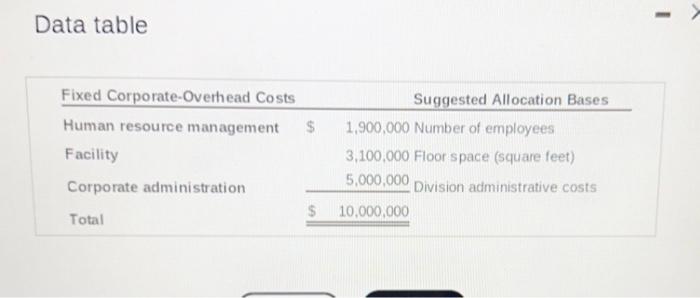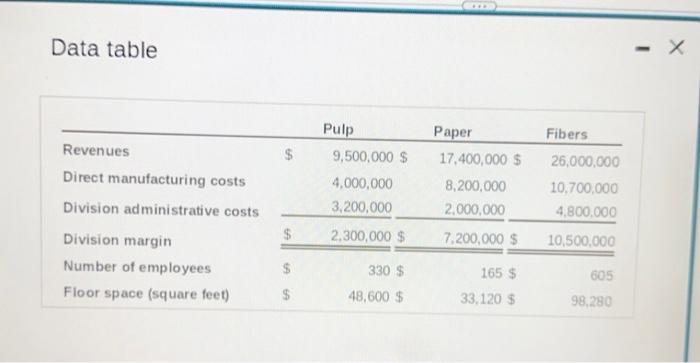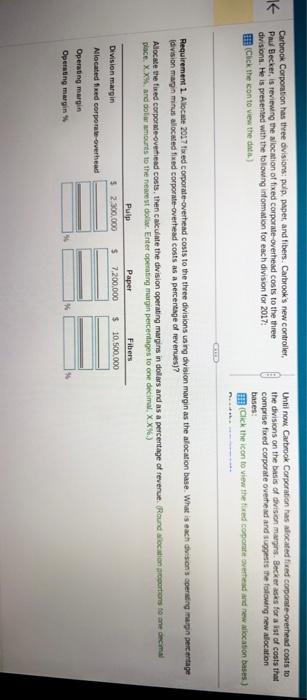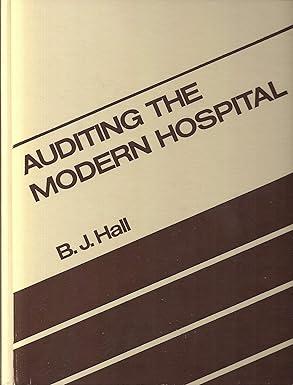please compelte all requirmenrs part 1,2,3,4
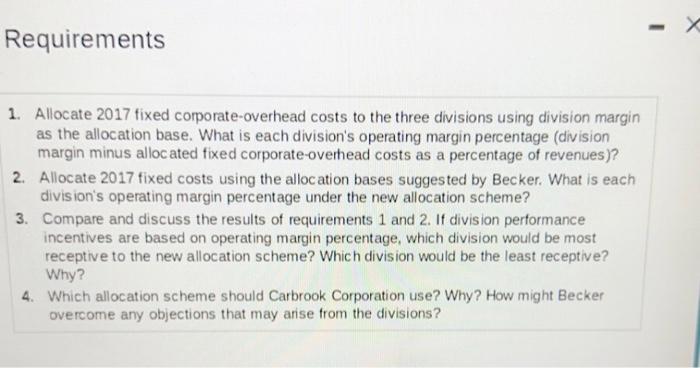
Requirements 1. Allocate 2017 fixed corporate-overhead costs to the three divisions using division margin as the allocation base. What is each division's operating margin percentage (division margin minus alloc ated fixed corporate-overhead costs as a percentage of revenues)? 2. Allocate 2017 fixed costs using the alloc ation bases suggested by Becker. What is each division's operating margin percentage under the new allocation scheme? 3. Compare and discuss the results of requirements 1 and 2 . If division performance incentives are based on operating margin percentage, which division would be most receptive to the new allocation scheme? Which division would be the least receptive? Why? 4. Which allocation scheme should Carbrook Corporation use? Why? How might Becker overcome any objections that may arise from the divisions? Data table Data table Carbrook Corponation has three divisions: pulp. papet, and fibers. Carbrook's new controller. Until now Carbook Corporation tas alocated fired corponte-overhead costs to Pais Becker, is reviewing the allocation of fixed corporate-overhead costs to the thee the divisions on the basis of divisicn maggins. Becker asks for a ist of costs that divisions. He is presented with the folowing information for each division for 2017: comprise fored corporate overtead and suggests the folowing new allocation (Click the con to view the datin.] bases: faick the icon bo view the tired coporate overteid and hew allocasion bases ) Requirement 1 . Alocate 2017 tixed corporate-overhead costs to the three divisions us ing division margin as the allocation base. What is each division s doeratng inapin pectertage [dvision mapin mitus allocaled fixed corporate-overhead costs as a percentage of revenues]? Requirement 2. Allocate 2017 fred costs using the allocalion bases soggested ty Crolt. What is each dvision's opeeating margin percentage under the new alocicion schere? Allocate the fixed copporate-overtwoad costs, then calculate the division opeeating margins is doliars and as a percentage of revenue. FRound allocition proporions to one decima Avequirement 3. Compare and dsciss the resuls of sequrements 1 and 2 If division podornance incentives ate based on operaeng margn percentage, which dveron mould be mont seceptive to the rew allocation scheme? Which division would be the least receptive? Why? When corporace cyetreakt is allocated to the dvisions on the basis of dvision maging (roquarement 1). ace (is) proficable and the Papert division is Ith dision is not protitatie ard the division is the mont protatide It division fertortarke is triked to operating mapgn percentages. Pulp will wessit tivs new way of allocating corporate coats, which causes its operatiog margn th decreate to a last (yeghtive operatung mavgin)." will weicome the change-is operating thayg percentage rises the most. Requirement 4. Which alociation sctweme stwuld Kunden Coeporation use? Why? How might Ciof overcome any obgections that may ardie from the duisiore? The ther dyisiors, Gratt may coporate overteid to divisions when evaluating performance


